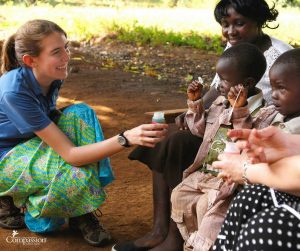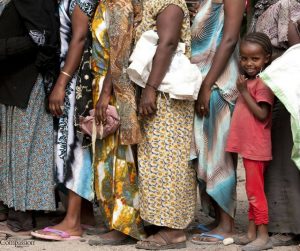Kenya (MNN) — The food crisis in Sub-Saharan Africa is difficult to grasp. The underlying issues are many, complicated, and require more than a quick fix. But as we consider both short and long-term solutions to the problem, there is no doubt the situation demands a response of compassion.

Earlier this year, the UN brought attention to the growing crisis, estimating that around 20 million people across Yemen, South Sudan, Somalia, and Nigeria were at serious risk of famine. But drought has taken a toll in parts of Ethiopia, Uganda, and Kenya, as well.
We spoke with Silas Irungu, Africa Communications Specialist from Compassion International. He says, “Because the rains have not shown up in some places for a number of years, there has been massive crop failure, they’ve had deaths of livestock, and as a result, massive malnutrition, especially in Somalia.”
And while the number of people in danger fluctuates with the weather patterns, there is one thing that remains the same. Women and children are the most vulnerable in this situation, and the hardest hit. As for groups of people, the farming and pastoral communities are struggling to survive. But really, Irungu says, the drought impacts everyone.
“Indirectly, you could say the entire population has been affected because on the front end, food prices have really increased and in some places it’s hard to find some commodities. It’s been difficult for families to use whatever income they have to feed themselves and they have had to look for substitutes or reduce their portions.”
Northern Kenya
Irungu, speaking from Kenya, shared the particular struggle in the northern part of the country.

“In Kenya, we’ve already heard that about four million people have been affected, and about 1.2 million of them are children who are facing starvation.”
To complicate matters, he says the hardest hit area in Kenya is near the Somali border where many people have been displaced over the border into Kenya.
“We’ve had cases of inter-communal conflict as a result of the drought,” Irungu says.
Government assistance
Scarcity of food has caused prices to increase drastically across the board.
“To give you perspective,” Irungu says, “over the last one year, a two kilogram packet of food — of maize meal — was going for 50 shillings. Now it is retailing at 150 shillings.”
The government is trying to dampen the strain of food prices. Earlier this year, they declared the drought a national disaster, meaning “that the government had to look for ways and means of feeding the 20,000 Kenyans who were displaced by drought in the northern part of the country.”
The first response included several hundreds of thousands of bags of grain from the Strategic Grain Reserve. However, Irungu says shortages still exist because many of the bags contained bad grain. The government is hoping to bring in maize soon.
In addition, the UN and other relief agencies have been called upon for help. But some of the hardest hit areas are also rural and difficult to reach by road.
Weather patterns
In some areas there has been minor relief from the drought.
“In the last couple of weeks, we have experienced rain in different parts of the country. In the Kenyan highlands where it is the breadbasket of the country, we’ve had episodes of rain and it’s been good relief for the farmers because now they can plant and hope for a harvest in the next couple of months.”
And while forecasts say there will be more rain to come, some of the driest areas will receive little.
Sponsorship network means timely response

While the drought has not directly affected Compassion’s Kenya program at this time, recent flooding in other parts of the country have. The ministry is working to respond through the sponsorship program. They are equipped to deal with disasters like this in a couple of ways.
First, they provide relief through child sponsorship. As they’ve seen in Uganda, the sponsorship program allows them to respond quickly and distribute aid to children and their families.
Secondly, because Compassion works closely with the local church to impact communities, they are able to assess the needs of each particular community and work on long-term solutions. For instance, they are looking for ways to improve local farming techniques to respond to severe weather patterns. And in some areas, they’ve installed watering holes for local livestock, sink bowls in the churches for anyone in need of clean drinking water, and water tanks. They’ve also taught water harvesting and food storage techniques.
Hope in the darkness
It is partnership like this through good times and bad that bring about total transformation — not just physically, but also spiritually.
Irungu says, yes, much of that happens through the curriculum at school and an environment that encourages fellowship and discipleship is based on the Gospel. But also, “In times like this when situations are dire, especially in these communities that have experienced drought or have faced displacement as a result of an inter-communal conflict, I think it’s a really good time to show the love of Jesus Christ. And how the Church has really responded in those places is being able to reach to the most vulnerable.”
There are several ways to support this ministry if you want to pray, give, or go.
Pray: Please pray for these communities where drought and conflict has impacted the people. Ask God to protect the most vulnerable — the women and children. Please pray for the leaders. Irungu says they have the capacity to make decisions that affect people, so pray they will be wise as they fight instability.
Give: Irungu asks you to consider sponsoring a child. He says, “By sponsoring a child, there are several ways you are impacting that child. One, that child gets an education. That child can get nutritional supplements when they come to the projects. And most importantly, that child is surrounded by people who love and care for them.”
You can also donate to specific projects here.
Go: “If you are able to, why don’t you visit the child that you sponsor?” Irungu asks. He says you might have something unique to bring to their community, whether you’re a doctor, a farmer, etc. Perhaps you have skills or expertise to leave behind that would make a long-term impact. To learn about visiting your sponsored child, click here.
He says “By praying, by giving, and by being a part of those communities…we will be able to reach more children, more families, and more communities and realize that relief from some of these clutches of poverty.”
